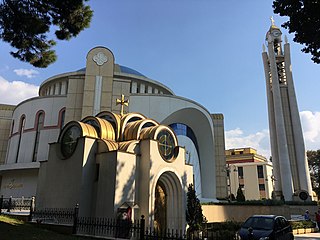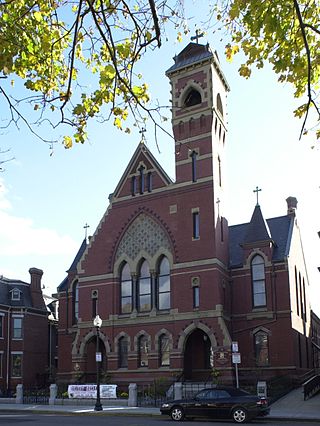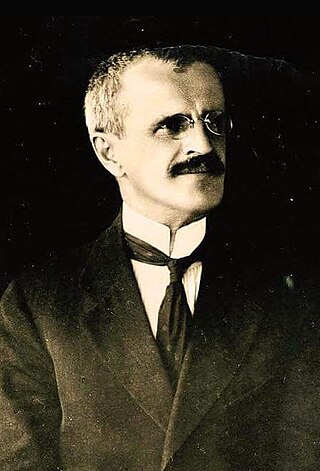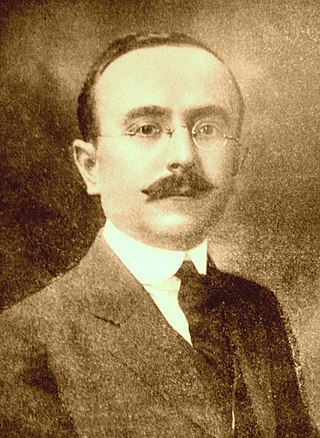Related Research Articles

Theofan Stilian Noli, known as Fan Noli, was an Albanian-American writer, scholar, diplomat, politician, historian, orator, Archbishop, Metropolitan and founder of the Albanian Orthodox Church and the Albanian Orthodox Archdiocese in America who served as Prime Minister and regent of Albania in 1924 during the June Revolution.

The Autocephalous Orthodox Church of Albania, commonly known as the Albanian Orthodox Church or the Orthodox Church of Albania, is an autocephalous Eastern Orthodox church. It declared its autocephaly in 1922 through its Congress of 1922, and gained recognition from the Patriarch of Constantinople in 1937.
Albania is a secular and religiously diverse country with no official religion and thus, freedom of religion, belief and conscience are guaranteed under the country's constitution. Islam is the most common religion in Albania, followed by Christianity, though religiosity is low and there are many irreligious Albanians. In the 2023 census, Muslims accounted for 51% of the total population, Christians made up 16%, while irreligious were 17%. The other 16% were undeclared.

The Albanian Archdiocese, also known as the Albanian Orthodox Archdiocese in America, is one of three ethnic dioceses of the Orthodox Church in America (OCA). Its territory includes parishes, and missions located in seven states in the United States – California, Connecticut, Massachusetts, Michigan, New York, Ohio, and Pennsylvania. The current bishop of the archdiocese is Nikodhim (Preston).

Archbishop Nikon was an Albanian bishop who served as the head of the Orthodox Church in America's Albanian Archdiocese and New England diocese.

The Principality of Albania was a monarchy from 1914 to 1925. It was headed by Wilhelm, Prince of Albania, and located in modern Albania in the Balkan region of Europe. The Ottoman Empire owned the land until the First Balkan War (1912—1913), which ended in the Treaty of London that formed the principality. The Principality of Albania survived invasions during World War I (1914—1918) and subsequent disputes over Albanian independence during the Paris Peace Conference (1919—1920). In 1925, the monarchy was abolished and the Albanian Republic (1925—1928), a parliamentary republic and dictatorship, was declared.
İbriktepe is a village in the İpsala District, Edirne Province in northwestern Turkey. The village had a population of 1,127 in 2022. Situated at the Turkey-Greece border, the village is 25 km (16 mi) away from İpsala and 100 km (62 mi) far from Edirne. Before the 2013 reorganisation, it was a town (belde).

Sotir Peci (1873–1932) was an Albanian politician, educator and mathematician. In 1906 he published the first Albanian-language newspaper in the United States of America in Boston. In 1908 he participated as a delegate in the Congress of Monastir. In 1920 he was appointed Minister of Education of Albania.

Tanush Thopia or Tanusio Thopia was an Albanian nobleman and one of the closest collaborators of Gjergj Kastrioti Skanderbeg.

The Albanian Orthodox Diocese of America is a jurisdiction of the Ecumenical Patriarchate in the United States.

Vatra is an association of Albanian Americans, created in 1912, that has historically protected the rights of the Albanians in the United States, as well as has endeavored in lobbying with the United States Congress about the rights of the Albanians throughout the world.
Besa-Besën was an organization of Albanian emigrants in Boston, Massachusetts.

Kol Tromara (1882–1945) was an Albanian nationalist and political figure of the first half of the 20th century.
Albanian nationalism in Albania emerged during the 19th century. The onset of the Great Eastern Crisis (1870s) that threatened partition of Balkan Albanian inhabited lands by neighbouring Orthodox Christian states stimulated the emergence of the Albanian national awakening (Rilindja) and nationalist movement. During the 19th century, some Western scholarly influences, Albanian diasporas such as the Arbëreshë and Albanian National Awakening figures contributed greatly to spreading influences and ideas among Balkan Albanians within the context of Albanian self-determination. Among those were ideas of an Illyrian contribution to Albanian ethnogenesis which still dominate Albanian nationalism in contemporary times and other ancient peoples claimed as ancestors of the Albanians, in particular the Pelasgians of which have been claimed again in recent times.

Stath Melani was an Albanian Orthodox priest who participated in the Congress of Manastir and helped spread awareness of the Albanian written language in southern Albania. He was killed by a group of Greek nationalists near Përmet for insisting on the use of the Albanian language in the local Orthodox liturgy.

Malli i Mëmëdheut was the first Albanian patriotic organisation in the United States. Founded on December 31, 1905 in Jamestown, New York State by Albanian immigrants from the region of Korçë, its purpose was the protection and promotion of Albanian culture, and mutual assistance between Albanians in the country.

Bishop Agathangjel was an Albanian Orthodox cleric and important figure of the early Albanian Orthodox Church. He was a staunch supporter of the autocephaly of Albanian Orthodoxy and a close collaborate of Fan Noli, founding father of the Albanian Orthodox Church. He was metropolitan bishop of Berat and was a member of the Holy Synod of the Albanian Orthodox Church.
The Greater Boston Area is home to a sizable Albanian American and Albanian immigrant community, especially within South Boston, Worcester, and Quincy. Massachusetts has the third-largest Albanian population in the U.S., with over 21,000 Albanians in residence; only New York and Michigan host larger populations.

Platon (Rozhdestvensky) (Russian: Платон (Рождественский), romanized:Platón Rozhdestvenskij; February 23 [O.S. February 11] 1866 - April 20, 1934), born Porphyry Theodorovich Rozhdestvensky (Russian: Порфи́рий Фёдорович Рожде́ственский, romanized:Porfírij Fjodorovich Rozhdéstvenskij), was the Russian Orthodox Archbishop of the Aleutians and North America from 1907 to 1914 and again from 1922 to 1934.
References
- 1 2 Tarasar, Constance J. (1975). Orthodox America, 1794-1976: development of the Orthodox Church in America. Bavarian State Library. p. 309. Retrieved 6 July 2020.
{{cite book}}: CS1 maint: location missing publisher (link) - 1 2 Skoulidas, Elias G. (2013). "The Albanian Greek-Orthodox Intellectuals: Aspects of their Discourse between Albanian and Greek National Narratives (late 19th - early 20th centuries)". Hronos. 7. Archived from the original on 23 September 2019. Retrieved 31 July 2020.
- ↑ Skendi, Stavro (1967). The Albanian National Awakening. Princeton: Princeton University Press. pp. 121–139. ISBN 9781400847761 . Retrieved 31 July 2020.
- ↑ Gawrych, George (2006). The Crescent and the Eagle: Ottoman Rule, Islam and the Albanians, 1874–1913. London: IB Tauris. p. 91. ISBN 9781845112875 . Retrieved 31 July 2020.
- 1 2 3 Lymperis, Denise (2017). "The 90th Anniversary Historical Trilogy". Saint George Cathedral. Archived from the original on 15 July 2011. Retrieved 6 July 2020.
- 1 2 3 4 5 Biernat, Agata (2014). "Albania and Albanian émigrés in the United States before World War II". In Mazurkiewicz, Anna (ed.). East Central Europe in Exile Volume 1: Transatlantic Migrations. Cambridge: Cambridge Scholars Publishing. pp. 9–22. ISBN 9781443868914.
- ↑ Stokoe, Mark; Kishkovsky, Very Rev. Leonid (1995). "Chapter 5 - Other Orthodox Immigrations". Orthodox Christians in North America (1794 - 1994) (PDF). Syosset, New York: Orthodox Christian Publications Center (OCPC). pp. 24–25. Retrieved 6 July 2020.
- ↑ Christo, Van (8 February 2006). "CHRONOLOGY: The Albanians of Boston". Boston: Frosina. Archived from the original on 14 December 2007.